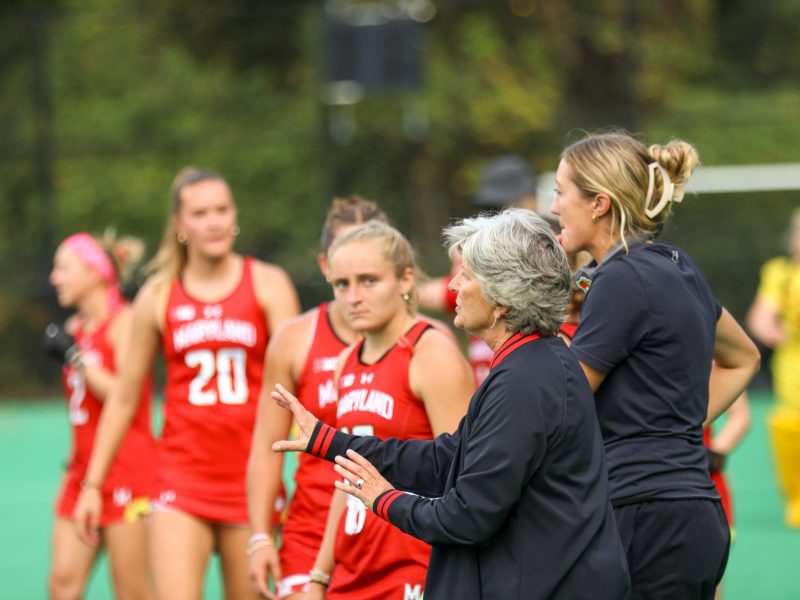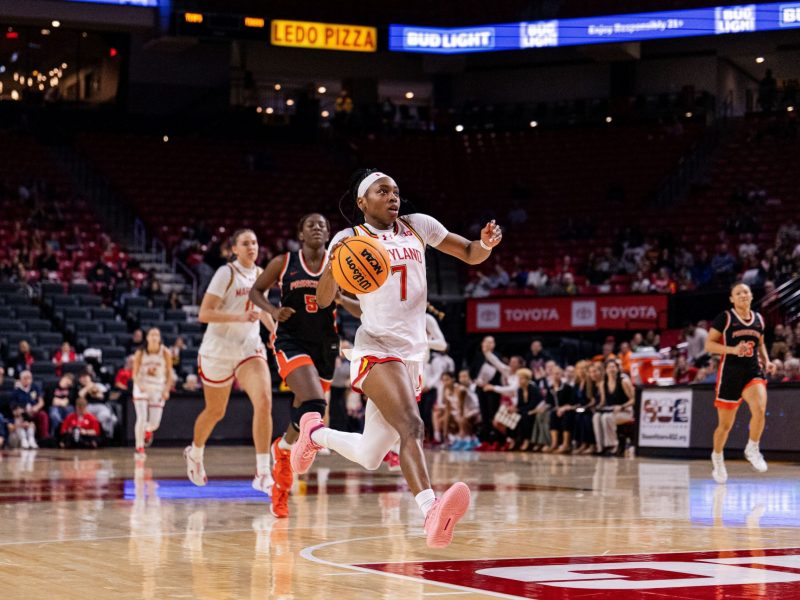Wearing the same pair of underwear, listening to Tate McRae and eating double-orange chicken from Panda Express all have one thing in common — they’re Maryland athletes’ pre-game superstitions.
Baseball and gymnastics are two of the most routine-based sports. At Maryland, many of the baseball players and gymnasts complete their own rituals before competition.
Maryland baseball coach Matt Swope played at Maryland from 1999 to 2002, and he describes himself as one of the most superstitious people he knows. He recalled a time during his freshman year when he did not wash his uniform for an entire weekend after getting 11 hits in three games.
One of the reasons he believes superstition is so ingrained in baseball is the sport’s technical foundation.
“The game is built upon failure … What sport can you fail seven out of 10 times and still be a Hall of Famer?” Swope asked.
Additionally, the long season can drive many players to develop superstitions in order to manage pressure. Swope said superstitions can keep baseball, the sport that plays the most games in one season, light and fun.
“Everyone has a routine … a pre-pitch routine, a pre-at-bat routine,” catcher Devin Russell said.
Right-handed pitcher James Gladden said players will do anything they can for an extra advantage. He described always sitting in the same spot in the dugout between innings and only placing his glove face up in his lap.
Baseball players don’t only have individual rituals, however. Russell explained that the team gathers to pray before the first pitch. Gladden mentioned that the team also meets in the locker room to listen to music together after batting practice.
[Meet Chuck Douglas, Maryland athletics’ most online fan]
Swope’s journey from Maryland baseball player to coach offers him a unique perspective on this university’s traditions.
“That’s what makes sports so great — the traditions that are built at all these different institutions,” Swope said.
Maryland gymnastics coach Brett Nelligan also advocates for the importance of team traditions.
One team tradition is to select a new mantra to focus on each season. Nelligan said this tradition becomes a part of the team’s identity, helping them compete to the best of their ability.
“This year’s mantra has been ‘good to great.’ Having a good meet is awesome and totally accessible, but we’re also going to look for moments to be great,” Nelligan said.
When Nelligan competed in college gymnastics, he and his teammates would always cook the same meal the night before a meet — baked ziti, salad and garlic bread. He also remembers refusing to wash his wristbands, as it was considered bad luck — a common superstition within the gymnastics community. Instead, when they started to fall apart, he would throw them away and buy new ones.
As a coach, if he gets a new tie and a meet doesn’t go well, he’ll often throw it away before it can even make it back on the bus.
[Maryland field hockey enters Big Ten tournament fighting for its NCAA bid]
Nelligan believes superstition can be good to calm an athlete down before competition, bringing them a sense of control — especially in high-stakes Division I sports.
“You’ve already been through so much,” Nelligan said. “Why not stand in a certain way? Why not cross your fingers?”
Senior Maddie Komoroski sleeps in the same pajamas the night before a meet, and Maia Lee, a gymnastics student manager, always braids her hair the same way before she competes.
Despite their prevalence, Nelligan believes that athletes shouldn’t place too much substance in following their superstitions or rituals. After more than 20 years of coaching, he has started to realize that none of those things truly matter, he said.
Komoroski shares a similar view.
“If I wore a different pair of pajamas the night before, it’s really not going to change anything,” Komoroski said. “I just try to remind myself I do it every day in practice.”
The most important thing is remembering that she is able to perform without superstitions, Komoroski said, and to focus on enjoying time with her team.
One way gymnasts do this is by passing down cheers from year to year, which the sophomores introduce to the freshmen. She recalled one in particular that the entire team does right before they compete.
“Give me a T. Give me an E. Give me an R. Give me a P. Give me an S. Terps, Terps, Terps!”



